Ulti is a complex trick taking game originally from Hungary. Although highly popular in that country it is extremely rare elsewhere. The game is traditionally played in Hungary using the 32 card German William Tell pack. This deck consists of the card ranks Ace, King, Over (Queen), Under (Jack), X, IX, VIII, and VII with one card in each of the four suits Acorns, Leaves, Bells, and Hearts. However, if such a traditional deck is not at hand, the game can also be played quite well using a standard French deck. The ranking of the cards as used for this game varies based on whether a trump suit is used during the hand (described below). Ulti is designed for play by three.
This is the usual ranking in every suit if a trump suit has been declared for the hand. However, if there hand is played with no trump suit the ranking of the cards is slightly different, as follows (also shown from highest to lowest); Ace, King, Queen, Jack, 10, 9, 8, 7.
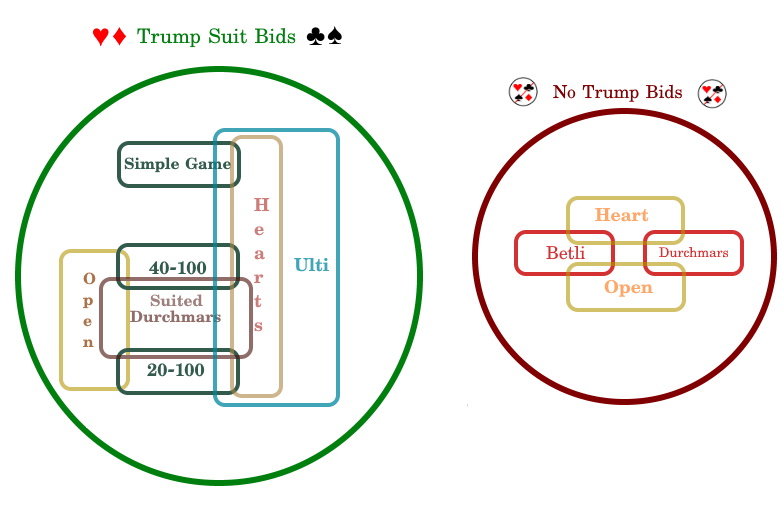 Determination of the first dealer and seating positions can be performed using a variety of methods. The usual method is for draw for low cards. The player each draw one card from the shuffled deck, and take a choice of seats at the table in order of cards dealt, starting with the lowest and continuing to the highest such ranked card. The player drawing the lowest ranked card is set as the first dealer. The role of dealer rotates in a counter-clockwise direction after every hand.
Determination of the first dealer and seating positions can be performed using a variety of methods. The usual method is for draw for low cards. The player each draw one card from the shuffled deck, and take a choice of seats at the table in order of cards dealt, starting with the lowest and continuing to the highest such ranked card. The player drawing the lowest ranked card is set as the first dealer. The role of dealer rotates in a counter-clockwise direction after every hand.
Once the dealer has been determined, that player should thoroughly shuffle the deck and after the shuffle offer the deck to the player at his left to cut. That player may either opt to cut the deck or simply tap the top of the deck indicating no cut is to occur. The specifics of the deal are also dependent on whether the deck was opted to be cut or not.
If the deck was cut, after this cut the dealer begins by dealing a batch of seven face-down cards to the player at his immediate right. He then deals a batch of five face-down cards to the remaining two players (including himself) in a counter-clockwise direction around the table. The dealer then deals another batch of five face-down cards to each of the three players in a counter-clockwise direction. The end result of this deal being that the player at his immediate right will have a hand consisting of 12 total cards, and the other two players will have 10 cards each. If, however, the player at dealer's left opted not to cut the deck, the cards are dealt somewhat differently. In this case, each player has his full hand dealt in one packet, the player to the dealer's immediate right receiving 12 face-down cards, and the two remaining players each receiving a 10 card packet.
After the cards have been dealt, and each player has picked up the cards dealt to him and examined his hand, a round of bidding occurs, called the Auction. The player to the dealer's immediate right must make the first bid, and thereafter the bidding rotates in a counter-clockwise direction around the table from player to player. The first player is always required to make a legal bid, and after making such a bid he discards any two cards from his hand face-down to the center of the table (called the talon). The next player in turn then decides if he wants to bid. If he opts to bid, he may (but is not required to) take the two discard cards into his hand and make a legal bid which must be higher than the previous high bid. After making a bid, if he opted to take the two discard cards into his hand, he selects any two cards from his hand and discards them face-down to the center of the table. A player may also simply pass, and make no bid, not taking the previously discarded cards into his hand. The bidding continues around the table in a counter-clockwise direction from player to player until all three players consecutively pass. If a player passes, he is still entitled to re-enter the bidding the next time the bidding rotates back to him. The game of Ulti features a variety of bids, many of which can be combined to create complex bid arrangements. The following chart details all the available bid types during the game:
| Bid Name | Description of Bid | Allowable Combinations | Point Value of Bid |
|---|---|---|---|
| Partie (Simple Bid) | The Simple Bid is the lowest allowable bid in the game of Ulti. This is a basic bid in which the player is declaring he intends to earn more points during the hand than that of his two opponent's scores combined. This bid is often announced by the player stating "Pass", which should not be confused with a player opting to not make a bid, which is sometime also stated by a player as "Pass". The standard simple Bid is a bid to play the hand using a specific suit as the trump suit. Normally this would be set one of three suits; clubs, spades, or diamonds. However, the player can add the Hearts bid modifier (see Hearts Suit bid in the chart below) to set hearts as the suit for the Simple game to be played in. In addition to winning the majority of points during the hand, the high bidder of this contract must also win at least one trick during the hand, but may also earn points from marriages earned during the hand. |
| 1 |
| Hearts Suit Bid | 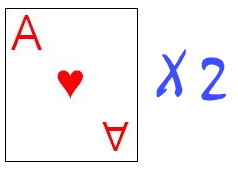 This is a bid to play the hand specifically using the suit of
hearts (♥) as the trump suit for the hand. The bid can never be made on it's own but must be made with one of the other bid types that features designation of a trump suit. When added to a base bid type, it doubles the value of that base bid. This is a bid to play the hand specifically using the suit of
hearts (♥) as the trump suit for the hand. The bid can never be made on it's own but must be made with one of the other bid types that features designation of a trump suit. When added to a base bid type, it doubles the value of that base bid.A Heart Betli bid is exactly the same as a normal Betli bid, however the score for the hand is doubled. Despite having the heart suit mentioned in the name, there is still no trump suit used during the hand. A Heart Durchmars bid is a bid to win every trick during the hand and either play the hand with no trump suit (but doubling the point value of a regular durchmar to 12) or using the suit of hearts as the trump suit (which also, subsequently doubles the point value of the bid). If played without a trump suit, no other bid can be combined with this bid. However, if played using the suit of hearts as the trump suit, it must be combined with one of the bid types; 40-100, 20-100, or Ulti. |
| x2 |
| Ulti | 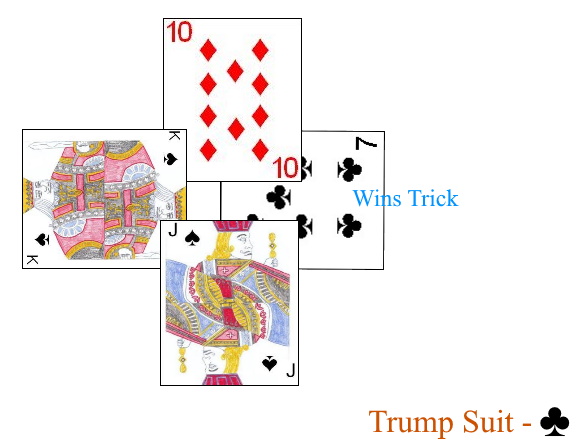 The Ulti bid is a declared bid to win the very last trick of the hand specifically using the seven of the trump suit. This bid may never be bid by itself, but must be combined with any other bid type in which some trump suit is to be used. The Ulti bid is a declared bid to win the very last trick of the hand specifically using the seven of the trump suit. This bid may never be bid by itself, but must be combined with any other bid type in which some trump suit is to be used. |
| 4 |
| 40-100 | This is a bid in which the bidder is declaring he will earn 100 or more card points during the hand. This score must include 40 points as earned for announcing a Marriage in the trump suit. However, no other Marriages may be announced by the declarer during the hand. The basic version of this bid is to play the hand using either the suit of clubs, spades, or diamonds as the trump suit for the hand. This bid may never be combined with a simple bid (see below). |
| 4 |
| 20-100 | The 20-100 bid is a declaration by the bidder to earn 100 or more card points during the hand. This score must include 20 points as earned for exactly one Marriage announced in a non-trump suit. The player may not announce any other Marriages during the hand. This bid may never be combined with a simple bid. |
| 8 |
| Betli | The Betli bid is one in which the declarer is announcing his intention to win zero tricks during the hand. Thus, in order to be successful with this bid, the declarer must lose every trick during this hand. No trump suit is used during the hand. |
| 5 |
| Open | A bid of Open is a bid to play the hand with the cards of all players exposed on the table after the first trick. Thus, after completion of the first trick each player must place the remainder of his hand face-up on the table, exposed for all players to see. This bid type may never be bid by itself, but may be combined with various other bid types. Despite the cards being exposed on the table, players may not consult one another as to play of these cards. |
| +15 |
| Durchmars | A Durchmars bid is a bid to win every trick during the hand. The player may elect to use any of the four suits; clubs, spades, diamonds, hearts, or may elect to play the hand without using any trump suit. If the player elects to use a trump suit, the bid must be combined with at least one of the following additional bid types; 40-100, 20-100, or Ulti. If the bidder elects to play the hand without a trump suit, this bid type can only be combined with the Hearts suit bid type (with the only effect of this to double the scoring value of the bid). | Hearts Suit Bid only with no trump suit, or with a trump suit;
| 6 |
| Open Durchmars | A bid of Open Durchmars is to win every trick during the hand, with all players exposing the entire hand face-up on the table after the first trick has been completed. Thus, after the first trick has been completed, every player must place his hand face-up on the table, playing from this exposed hand. Players may not consult each other on play of the hand, despite the fact that all cards are exposed, face-up on the table. This hand can be declared to be played using no trump suit or using any of the four suits (including hearts) as the trump suit for the hand. Regardless of the suit used, the point value of this base bid is always the same, although the value of any additional modifiers added to the bid are double as normal. If no trump suit is to be used for the hand, this bid may not be combined with any other bid type, however if any trump suit is to be used, this bid must be combined with one or more of the following bids; 40-100, 20-100, Ulti. | Hearts Suit Bid only, with no trump suit, or, with a trump suit;
| 24 |
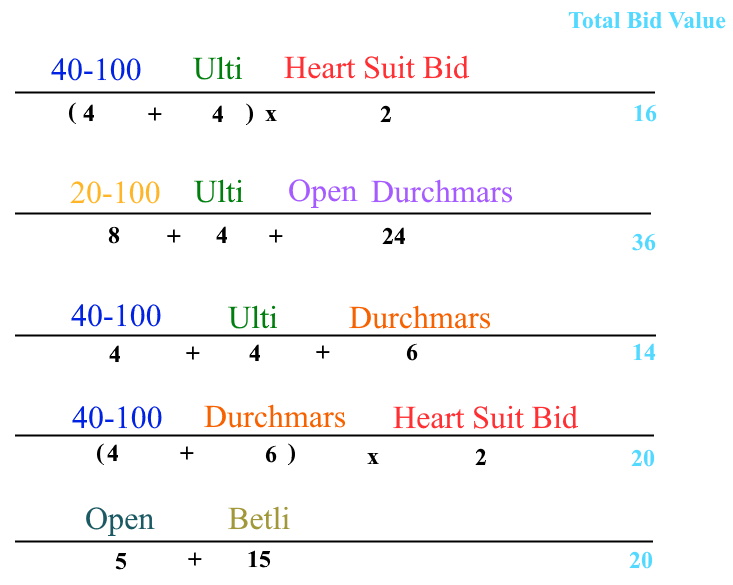 The value of a player's bid is thus the total value of all portions of that bid, including all modifiers. Thus, in order to be considered a higher bid, a bid must have a higher total value (combining all aspects of the bid) than the previous high bid. Once all three players pass after the last legal bid, that high bid is considered the contract for the game, and the player making that bid is thus set as the Contractor for the hand. If the contract type allows, and is to be played in a trump suit, and this has not yet been already specified, the contractor indicates the trump suit for the hand (or no trump in the contract types that allow this). If the high bid was a simple bid, with no additional modifiers to that bid, the player may, elect to give up without play of the hand. If he does this, that player will immediately lose two game points and each opponent will earn two such points, but will
prevent that player from losing any additional game points that may occur after play of the hand. Play of the hand begins with the contractor leading the first card to the first trick.
The value of a player's bid is thus the total value of all portions of that bid, including all modifiers. Thus, in order to be considered a higher bid, a bid must have a higher total value (combining all aspects of the bid) than the previous high bid. Once all three players pass after the last legal bid, that high bid is considered the contract for the game, and the player making that bid is thus set as the Contractor for the hand. If the contract type allows, and is to be played in a trump suit, and this has not yet been already specified, the contractor indicates the trump suit for the hand (or no trump in the contract types that allow this). If the high bid was a simple bid, with no additional modifiers to that bid, the player may, elect to give up without play of the hand. If he does this, that player will immediately lose two game points and each opponent will earn two such points, but will
prevent that player from losing any additional game points that may occur after play of the hand. Play of the hand begins with the contractor leading the first card to the first trick.
As each player plays his first card to the first trick, if that player has a King and Queen of the same suit, that player can declare and score for a Marriage. Having the King and Queen in the declared trump suit for the hand entitles the player to score 40 points (announced by simply calling "40") and having a King and Queen of the same suit in any non-trump suit allows the player to score 20 (announced by calling "20"). The declaring player does not need to reveal which suit the Marriage is in (although this is self-evident if calling a "40") and is not required to show the cards which form the Marriage. A player who has, in hand, multiple Marriages is entitled to announce and score for all of them, all on the first trick. Scoring for Marriages only applies in hands in which a trump suit is declared and used. Also, in a game in which a 40-100 bid or 20-100 bid is announced, only the contractor can declare a Marriage, and he can only declare one such Marriage, which must be in correspondence to the bid type (Marriage in the trump suit or Marriage in a minor suit).
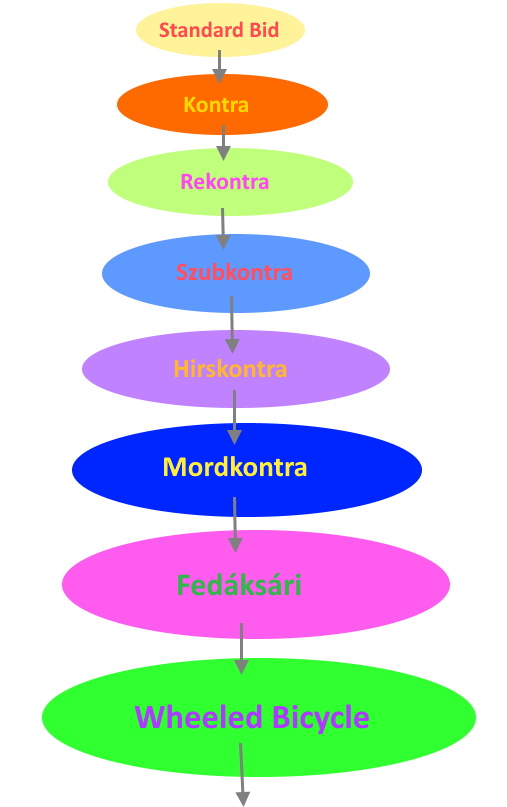
Trivia: The Fedáksári doubling
announcement is
named after the famous Hungarian singer and
actress Fedák Sári who lived and performed in the
late 19th and early 20th centuries.
As each opponent plays his first card to the first trick, that player also has the opportunity to announce "Kontra". This is an announcement to double the scoring or penalty value of the whole, or certain portions of the bid. Thus, after announcing "Kontra" the player would indicate which portions of the bid he wants to set at double score for the hand. In games which feature a trump suit, the decision for an opponent Kontra is applied to both of the opponents (regardless of which specific opponent Kontra'd), however in a game which is played with no trump suit, an announced Kontra is only applied to the player calling the Kontra. The second opponent, as he plays his first card may then also Kontra those portions of the bid which were not already Kontra'd (or any portion of the bid in a hand played with no trump suit). After one or both opponents Kontra either part or all of the bid, at the conclusion of the first trick, the contractor can then opt to announce "Rekontra" on some or all of the bids which were Kontra'd, which will then double the value of those portions of the bid again. If the contractor opts to ReKontra, the opponents, again, in turn have the opportunity to double yet again (called Szubkontra), and the contractor can double yet again. This can actually continue to almost any level, with the opposing side doubling (if they prefer) any portions of the bid that were previously doubled by a member of the opposition. All such doubling should then occur before the first card is lead to the second trick. Although the doubling of any particular bid (or portion of a bid) can be increased indefinitely, it is very rare for this doubling to ever proceed beyond the level of ReKontra. The names for the first seven levels of doubles have fairly standard names, as follows; Kontra, Rekontra, Szubkontra, Hirskontra, Mordkontra,
Fedáksári, Wheeled Bicycle.
named after the famous Hungarian singer and
actress Fedák Sári who lived and performed in the
late 19th and early 20th centuries.
The leader to each trick can select any card remaining in his hand to lead to that trick. Each other player, in a counter-clockwise direction must then play one card from his hand to the trick. If the player has a card of the same suit as originally led to that trick he must play it, and must attempt to win the trick if able. If the player has no card of the suit led to this trick, he must play a card of the trump suit if he has one, and if the trick already contains one or more cards in the trump suit, he must attempt to win the trick by playing a higher card of that trump suit, if able. If the player has no cards of the suit led and no cards of the trump suit, he may play any card from his hand to the trick.
It should be remembered that the ranking of the cards will be different based on whether the hand will be played with or without a trump suit. In any hand in which a trump suit is used, the ranking of the cards, in every suit (including the designated trump suit) is as follows (from high to low); Ace, 10, King, Queen, Jack, 9, 8, 7. However, in a hand in which no trump suit is to be used, the ranking of the cards in the deck (in every suit) is slightly different as follows (from high to low); Ace, King, Queen, Jack, 10, 9, 8, 7.
The highest card in the trump suit played to that trick wins it. If the trick contains no cards of the trump suit, the highest card of the suit originally led to the trick wins the trick. The winner of each trick should take the cards won in the trick and place them in a face-down pile out of play for later scoring. The winner of each trick also leads the first card to the next trick.
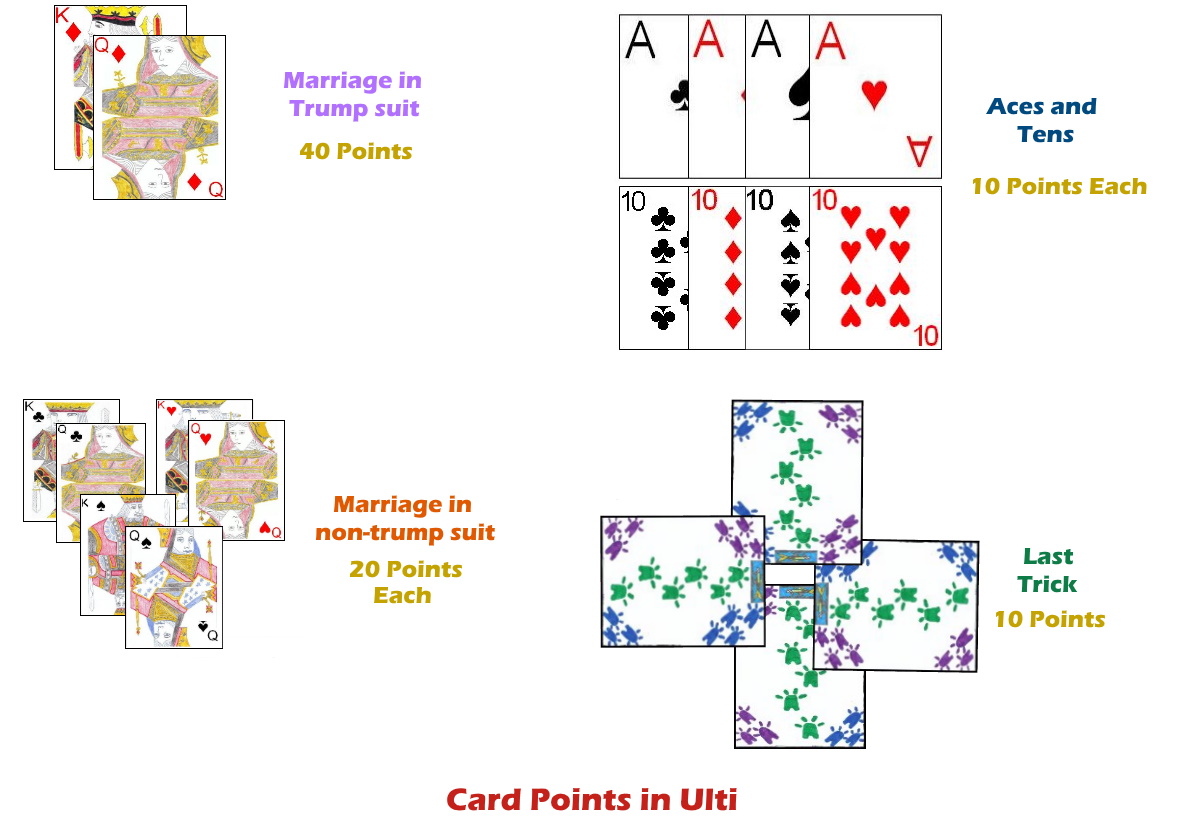 After all tricks have been played and won it is determined if the contractor managed to make his bid (or parts of his bid). For certain bid types, this will be dependent on certain special criteria such as winning every trick or winning the last trick with a certain card. For others this will be based on the number of card points captured by the contractor during the hand. For these purposes, in addition to any Marriages which are declared, the winner of the last trick scores 10 card points and each Ace and ten captured in tricks during the hand score ten points each. Any point scoring cards left remaining in the talon are credited to the opponents of the contractor.
After all tricks have been played and won it is determined if the contractor managed to make his bid (or parts of his bid). For certain bid types, this will be dependent on certain special criteria such as winning every trick or winning the last trick with a certain card. For others this will be based on the number of card points captured by the contractor during the hand. For these purposes, in addition to any Marriages which are declared, the winner of the last trick scores 10 card points and each Ace and ten captured in tricks during the hand score ten points each. Any point scoring cards left remaining in the talon are credited to the opponents of the contractor.
Each portion of the bid should be determined on it's own, such that a player may succeed in some parts of his bid and fail at others. Thus, the contractor will score a number of game points (as given in the chart above) for the bids in which he was successful but will also lose game points for portions of his bid in which he was unable to complete successfully. Thus, the final game point score awarded to that player will be a summation of the won and lost game points from that hand (which could be a negative total). The opponents also earn or lose game points during the hand. Thus, for each game point the contractor earns (for successful contracts), each of the two opponents will correspondingly each lose one game point. In the same manner, for each game point the contractor loses (due to a failed portion of the contract) each opponent will earn one game point. This score would also be adjusted by any kontra, rekontra, etc. performed during the hand. It should be noted (as described in the bid description from the chart) that contract types of Betli and Durchmars can be independently doubled (Kontra'd, Rekontra'd, etc.) and thus the game points would only apply to that opponent (bonus or penalty). One notable exception to this rule is that of an increased (Kontra, Rekontra, etc.) Ulti bid. If the Ulti is successful the player wins the appropriate level of increase, however if the Ulti is unsuccessful, the bonus points earned by the opponents as a result of the failed Ulti is not modified by any amount of doubling.
In addition to scoring for contracts bid and made, the contractor can also score for certain contract types that were not part of his bid, but which he accomplished, although he will score less than for having actually bid that type (However, there can also be corresponding penalties if certain conditions are not fulfilled). These are sometimes called Silent Bids. The following are the types of such bids that a contractor might score for despite having not bid them:
- Unbid Ulti: If the contractor manages to win the last trick of the hand using the seven of the trump suit (Ulti), despite not having declared Ulti, he earns two Game Points per opponent, and each opponent corresponding loses two game points. However, if the contractor plays the seven of the trump suit to the last trick of the hand and fails to win that trick (and not having declared the Ulti bid), he loses four game points and each opponent earns two.
- Opponent Unbid Ulti: Similar to a standard Ulti, if one of the opponents wins the last trick of the hand with the seven of the trump suit each opponent earns two game points and the declarer loses four. However, if one opponent plays the seven of the trump suit to the last trick of the hand and that card fails to win the trick, each opponent loses four game points and the contractor earns 8.
- Unbid 100: If the contractor manages to earn 100 or more card points, after having bid a simple game which features a trump suit, and the contractor has won at least one trick during the hand, the points earned for the base contract itself (i.e. Simple Game) are doubled. The card points used to reach 100 points can include one or more Marriages.
- Opponent Unbid 100: In a hand in which the high bid was a Simple Game and the opponents manage to score at least 100 card points during the hand (including at least one trick one amongst them), the score and penalties for the hand is doubled. Reaching the score of 100 may include one or more declared Marriages.
- Unbid Durchmars: If the high bid featured a trump suit and the contractor managed to win every trick during the hand, but did not bid Durchmars the contractor earns 3 game points. If the high bid was any simple game, the 3 points replace the score for the base simple game.
- Opponent Unbid Durchmars: If the high bid by the Contractor for the hand was not Durchmars, but the opponents manage to win every trick during the hand, each opponent wins 3 game points, and the Contractor loses 6. If the core bid (bid made to which the Durchmars modifier was added) was a Simple Game bid, this score replaces the score which would normally be earned for the Simple Game bid.
There is usually no specific scoring or other game criteria to determine when the entire game session might be over (such as reaching a set amount of game points, or a specific number of hands played). However, this determination of completion of a full Game should be discussed before the beginning of the game. There is, however, a traditional method of declaring or determining the end of the game. At any point during the game, any player may state the phrase "The Ace of hearts deals and does not deal". Upon this phrase being spoken, it is noted, on the following hand (after the one in which the phrase is uttered), which player has been dealt the Ace of hearts. If the Ace of hearts, on that hand, was dealt to the talon, it would instead be noted who is dealt the Ace of hearts on the next hand after. Play continues until the player who had thus been noted has his turn to deal. After this player deals a hand, exactly two more hands are dealt, after which the game is terminated. Regardless of the method used to end a session of Ulti, the player with the highest total number of Game Points is declared the game or session winner.
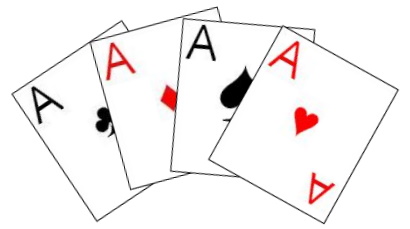 Additional Bid Type - Négy Ász (Four Aces): Many Ulti players include an additional allowable bid, called Négy Ász, or in
the English language, "Four Aces". This bid may never be bid by itself or with a Simple Bid, but may be bid with any other contract which features use of a trump suit during play. The bid is indicating that a player intends to win all four Aces in tricks over the course of the hand. If this contract is bid and made by the Contractor, that player earns four points per opponent, and if the bid fails, the Contractor loses four points per opponent (with each opponent, as usual earning four points). This score will also be affected by any doubling due to the hand being played in the suit of hearts, or Kontra and Rekontra calls made. Similar to some of the other bid types, this bid type can also earn points if not actually bid but the player manages to win all four Aces, which is
thus 2 Game Points per opponent.
Additional Bid Type - Négy Ász (Four Aces): Many Ulti players include an additional allowable bid, called Négy Ász, or in
the English language, "Four Aces". This bid may never be bid by itself or with a Simple Bid, but may be bid with any other contract which features use of a trump suit during play. The bid is indicating that a player intends to win all four Aces in tricks over the course of the hand. If this contract is bid and made by the Contractor, that player earns four points per opponent, and if the bid fails, the Contractor loses four points per opponent (with each opponent, as usual earning four points). This score will also be affected by any doubling due to the hand being played in the suit of hearts, or Kontra and Rekontra calls made. Similar to some of the other bid types, this bid type can also earn points if not actually bid but the player manages to win all four Aces, which is
thus 2 Game Points per opponent.
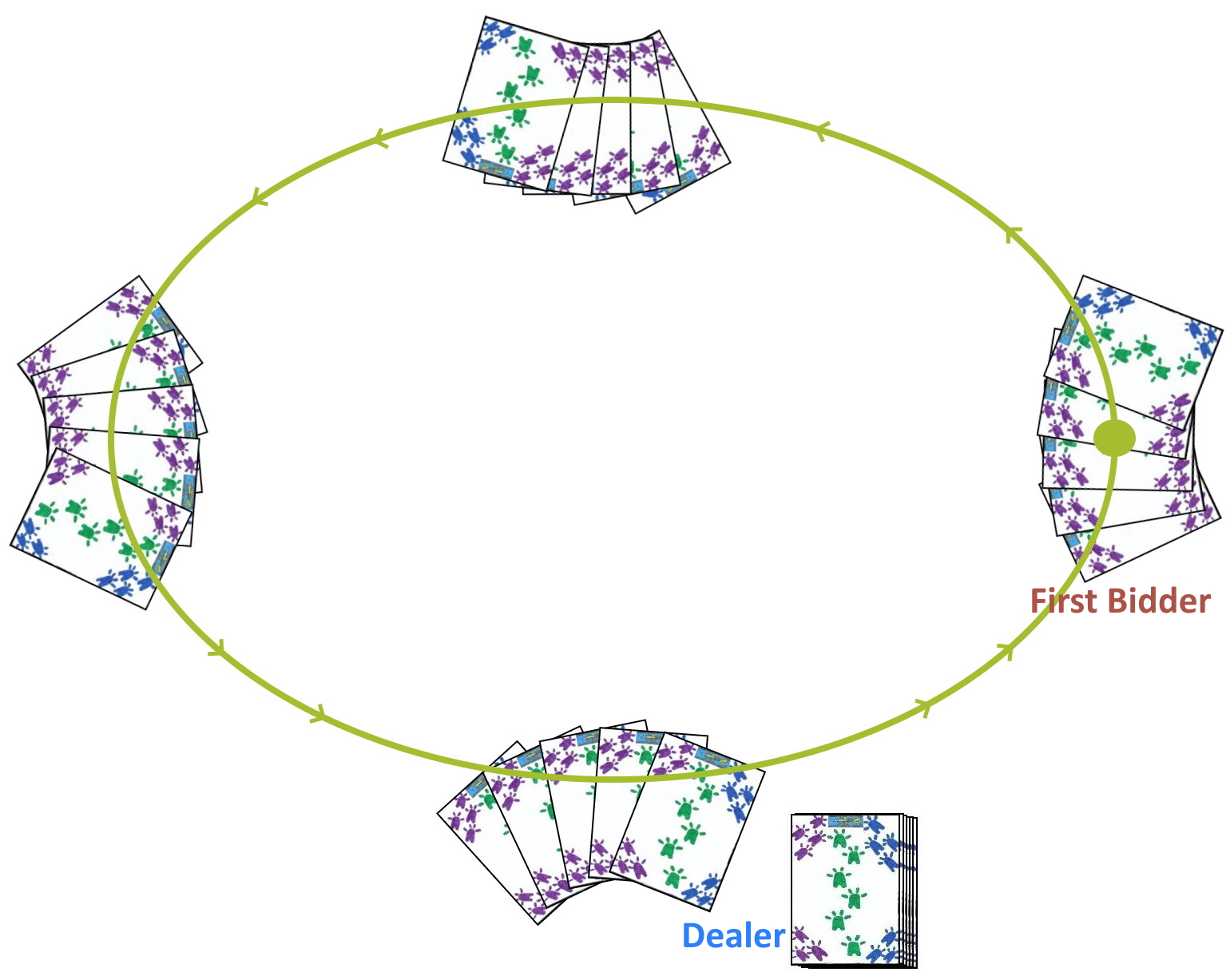 Thus, in the initial deal, each player receives only five cards and no cards are yet dealt to the talon. The player to the immediate right of the dealer makes the first bid, but this player is never required to make a bid. This player and each other player during this first round of bidding will thus make his bid based on the five cards he has so far been dealt. In this round, the bidding value (and eventual scoring value) of all bids made during this round is double the normal values. In naming a bid which features a trump suit, the bidder must name that trump suit during this bidding round. The bidding continues until a high bid is followed by two consecutive passes, with this player currently considered the highest bidder. If a high bidder has been established, there is the opportunity of doubling (Kontra, Rekontra,
etc.) as in the standard game. However, each doubling call during this round multiplies the point values from the previous value by four rather than two.
Thus, in the initial deal, each player receives only five cards and no cards are yet dealt to the talon. The player to the immediate right of the dealer makes the first bid, but this player is never required to make a bid. This player and each other player during this first round of bidding will thus make his bid based on the five cards he has so far been dealt. In this round, the bidding value (and eventual scoring value) of all bids made during this round is double the normal values. In naming a bid which features a trump suit, the bidder must name that trump suit during this bidding round. The bidding continues until a high bid is followed by two consecutive passes, with this player currently considered the highest bidder. If a high bidder has been established, there is the opportunity of doubling (Kontra, Rekontra,
etc.) as in the standard game. However, each doubling call during this round multiplies the point values from the previous value by four rather than two.